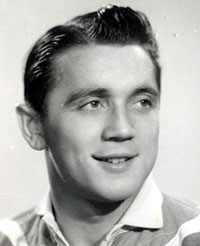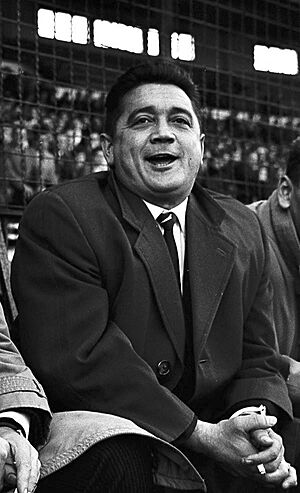Puig Aubert facts for kids
 |
|||||||||||||||||||||||||||||||||||||||||||||||||||||||||||||||||||||||
|
Personal information
|
|||||||||||||||||||||||||||||||||||||||||||||||||||||||||||||||||||||||
|---|---|---|---|---|---|---|---|---|---|---|---|---|---|---|---|---|---|---|---|---|---|---|---|---|---|---|---|---|---|---|---|---|---|---|---|---|---|---|---|---|---|---|---|---|---|---|---|---|---|---|---|---|---|---|---|---|---|---|---|---|---|---|---|---|---|---|---|---|---|---|---|
| Full name | Robert Aubert Puig | ||||||||||||||||||||||||||||||||||||||||||||||||||||||||||||||||||||||
| Born | 24 March 1925 Andernach, Germany |
||||||||||||||||||||||||||||||||||||||||||||||||||||||||||||||||||||||
| Died | 3 June 1994 (aged 69) Carcassonne, France |
||||||||||||||||||||||||||||||||||||||||||||||||||||||||||||||||||||||
|
Playing information
|
|||||||||||||||||||||||||||||||||||||||||||||||||||||||||||||||||||||||
| Height | 167 cm (5 ft 6 in) | ||||||||||||||||||||||||||||||||||||||||||||||||||||||||||||||||||||||
| Weight | 60 kg (9 st 6 lb) | ||||||||||||||||||||||||||||||||||||||||||||||||||||||||||||||||||||||
| Position | Fullback | ||||||||||||||||||||||||||||||||||||||||||||||||||||||||||||||||||||||
|
|||||||||||||||||||||||||||||||||||||||||||||||||||||||||||||||||||||||
|
Coaching information
|
|||||||||||||||||||||||||||||||||||||||||||||||||||||||||||||||||||||||
|
|||||||||||||||||||||||||||||||||||||||||||||||||||||||||||||||||||||||
Puig Aubert (born Robert Aubert Puig, March 24, 1925 – June 3, 1994) is often called the greatest French rugby league player ever. He played for 16 years as a professional. He played for teams like Carcassonne, XIII Catalan, Celtic de Paris, and Castelnaudary. He won five French championships and four French cups. He also played for the French national team 46 times.
He mainly played as a fullback (fullback). After he stopped playing in 1960, he became a coach for Carcassonne and the French national team. He also helped choose players for the French national team for many years.
Aubert's real name was Robert Aubert Puig. When he joined Carcassonne as a teenager, there were other players with the same last name. A local newspaper editor printed his name backward to avoid confusion. This new name stuck, and he became very famous.
His nickname "Pipette" came from his habit of smoking. Sometimes, he even smoked during games! In one famous game against Wigan during a snowstorm, he caught the ball with one hand while holding a cigarette in the other. Even though he had unusual habits for a sportsman, everyone agreed he was very talented. He was amazing at kicking the ball during play. His attacking style was unique and hard to predict.
Besides his skills, he was known for his interesting personality. He sometimes chose not to tackle a player if he thought it would show that his teammates had made a mistake earlier. This caused some talk during his career.
A highlight of Aubert's career was his 1951 tour of Australasia. He played in 25 out of France's 29 matches. He scored a record 221 points on this tour. His great performances in 1951 earned him France's "Champion of Champions" title. This was the first time a player from any sport had received this special award. In 1988, he was added to the Rugby League Hall of Fame.
Contents
Early Life and First Steps in Rugby
Robert was born in Andernach, Germany. His mother was German, and his father was French. When Robert was a baby, his family moved to Carcassonne, France. This is where Robert would become a legend in French sports and rugby.
Robert first tried out for the USA Perpignan team. He quickly joined their junior teams. In 1943, he helped Perpignan win the junior French championship. In the same year, he played his first game for the main team. He replaced a player who had an accident. Perpignan won the game, thanks to two special kicks from Puig-Aubert.
In March 1944, he helped Perpignan win another championship, beating Aviron bayonnais 20 to 5.
Rugby League Becomes Legal Again
In early 1944, the Vichy government lost power. This meant that rugby league was no longer banned in France. Club presidents wanted to make the sport popular again. They tried to get famous rugby union players to join. Robert was approached by Carcassonne, Albi, Toulouse, and XIII Catalan. He decided to join AS Carcassonne. He played his first rugby league match on November 13, 1944, against Béziers.
Playing for AS Carcassonne
Robert was still a teenager when he joined Carcassonne in 1944. This was when the French championship started again after rugby league was no longer banned. Later that year, Puig was chosen to play in a regular game. Because several other players had the last name Puig, a local newspaper printed his name backward to avoid confusion. From that day on, he was known as Puig Aubert.
Over the next nine years, Aubert became a huge success. He became a legend for Carcassonne, rugby league, and France. He also played his first game for the national team in 1944. He led his club, often as captain, to four French championship titles. He also won four Lord Derby cups. His team was also runner-up in the championship four times and in the Lord Derby cup three times.
Time with XIII Catalans
After ten successful years with Carcassonne, Aubert left his first professional club. He moved to the rival XIII Catalan club. He was their captain for the next four years. While at XIII Catalan, his fitness became a challenge. His weight changed a lot, and he continued to smoke. This made it harder for him to compete in the professional championship as the years went by.
During his time with the Catalan team, he won another French championship title in his last year with the club in 1957.
Playing for Celtic de Paris
As his football career was slowing down, Aubert moved to Paris. He joined Celtic de Paris, a team in a lower division. However, he wasn't very keen on training. This started to affect his rugby league skills. His weight also increased a lot during this time.
After one year in Paris, Aubert wanted to move back to the south of France. He decided not to sign another contract and left the club.
Joining RC Castelnaudary
In 1959, Aubert signed with the lower division team Castelnaudary. But his weight and fitness problems continued. He played only a few games that season. He then retired from playing professional rugby league at the age of 35, after the season ended.
Representing France
Aubert played his first international rugby league game for the French national team as a fullback in 1944. This was during a tour in Great Britain. He quickly became very popular with rugby league fans. People loved his unique and unpredictable way of playing. They also noticed his relaxed attitude towards defense. He often said it wasn't the fullback's job to tackle. Sometimes he even claimed he was punishing other players for missing a tackle before him. He also had unusual actions on the field, like playing while smoking. During half-time breaks, he was known to drink up to three glasses of red wine. After scoring tries, he would sometimes leave a small poem behind the opposing team's goal line to annoy them. Despite all this, everyone in rugby league saw him as a true genius because of his amazing kicking skills.
In 1954, Aubert was the captain of the French team in the first ever World Cup. He scored the first drop goal and the first penalty goal in World Cup history. He led his team to a 22–13 win over New Zealand in Paris. During the competition, he scored 26 points. He led his team to the final against the British team. They lost closely by four points, 16 to 12.
Touring Australia and New Zealand
Aubert was the captain of the 1951 French rugby league tour of Australia and New Zealand. This was the French team's first tour there. Aubert led France to win the Test series against the Clive Churchill-captained Australians by 2–1. Both champion fullbacks, Aubert and Churchill, excited the crowds with their play. The three test matches in Australia attracted over 162,000 fans. However, the French team lost their only test against New Zealand 16–15 in Auckland.
The peak of his success was when he captained France on the 1951 tour of Australasia. They won the Test series against Australia. Aubert kicked 18 goals from 18 attempts, a record that no tourist has beaten since. The opposing halfback in that series, Keith Holman, said: "I've never seen his equal, A terrific player and a terrific gentleman. As a goalkicker he had no equal – and no one since can compare."
During that tour, Puig Aubert played in 25 of France's 29 matches. He scored a record 221 points (163 of them in Australia). This was even more than the British great Jim Sullivan. His performances in 1951 earned him the "Champion of Champions" title from the French sports newspaper L'Equipe. This made him the first player from any sport to receive this honor.
Over 10 years in the international game, Aubert played 46 times for the national team. He scored a total of 361 points in his 27 test matches, four World Cup appearances, and 15 European cup games. This included two wins in the European Cup tournament.
Career Playing Statistics
Point Scoring Summary
| Games | Tries | Goals | F/G | Points |
|---|---|---|---|---|
| 46 | * | * | – | 361 |
Matches Played
| Team | Matches | Years |
|---|---|---|
| France | 46 | 1946–1956 |
Life After Rugby League
After he retired from professional rugby in 1960, Aubert worked for the Paul Ricard company. At the same time, he also coached junior teams for AS Carcassonne. In 1969, Aubert was chosen to lead the selection committee for the French national team. He held this job for ten years.
Puig Aubert passed away in his hometown of Carcassonne on June 3, 1994.
Six years after he died, his first club built a 300 kg (660 lb), 1.7 m (5 ft 7 in) tall bronze statue in his honor. It stands outside the AS Carcassonne club ground, Stade Albert Domec. A commemorative plaque on the statue reads: "With Puig-Aubert, symbol of rugby à XIII (Rugby League); Champion of the world in the tricolour shirt; Champion of the French champions for the year 1951".
In 2004, Bernard Pratviel wrote a book about him called Immortal Pipette.
See Also
- Henri Riu (French rugby union and rugby league player)
 | Aurelia Browder |
 | Nannie Helen Burroughs |
 | Michelle Alexander |


